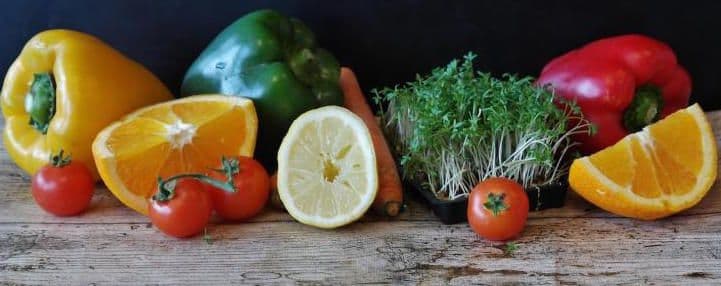Fertility Diet Guide for Women and Men
Food and Nutrition
Obie Editorial Team

Pregnancy may last 40 weeks or about nine months, but preparation for that journey starts months or years in advance. You can improve your diet and other habits in a matter of weeks (although larger health issues can take longer to resolve). Your preconception health is vital to your pregnancy health. Growing research shows that the right nutrition in women and men can improve fertility and improve your chances of getting pregnant.
Are you fertile? Find out now! Take our fertility test to get your personal report instantly.
Research about fertility and diet
Results from a Harvard’s Nurses’ Health Study suggest that the majority of infertility cases due to ovulation disorders are preventable by modifying diet and lifestyle. This large study followed 17,544 women without a history of infertility for 8 years while they tried to become or became pregnant. Another study from Australia showed that fast food and less fruit in the diet decreased fertility.
Researchers say that a woman’s diet affects ovulation, and hypothesize that women with healthy insulin levels — the hormone that controls blood sugar — are more likely to ovulate normally. Those who have insulin resistance or diabetes are more prone to irregular ovulation.
In males, research has shown that semen quality in men improves with a "prudent" diet (high intake of fish, chicken, fruit, vegetables, legumes and whole grains) as compared to a "Western" diet (high intake of red and processed meat, refined grains, pizza, snacks, high-energy drinks, and sweets).
5 diet and lifestyle habits to help improve female fertility:
1. Take a multivitamin
Women who took a multivitamin containing folic acid were more likely to become pregnant. Folic acid helps prevent birth defects of the brain and spinal cord. All women who can get pregnant should take a daily multivitamin containing at least 400-800 micrograms of folic acid every day. FertilAid for women is the perfect preconception vitamin and FertilAid for Men is his perfect preconception supplement. Both are all-natural and contain several fertility-enhancing ingredients.
2. Get your iron from plants
Women with higher iron-intakes were also more likely to become pregnant, but the iron had to come from plant sources or supplements, not red meat. Vegetables, beans, nuts, and soy products are all good sources of iron. Consuming plant-sources of iron with vitamin C, found in many fruits — especially citrus, helps aid in absorption.
3. Avoid trans fats
The study suggests that trans fats may disrupt hormone balance and increase insulin resistance. The researchers, along with health experts, recommend eating as little as possible. Try replacing processed foods such as margarine, doughnuts, cookies, and chips, with less processed and more nutritious foods such as whole grains, fruits, and vegetables. This appears to have a beneficial effect on insulin levels, helping to promote healthy ovulation.
4. Strive for a healthy weight
The coauthors of The Fertility Diet, the book based on the Nurses Health Study, states “…the most important thing would be to get to a healthy body weight.” Women who had a body mass index between 20 and 24 had the best chance of getting pregnant. Numerous studies have shown that an overweight woman can jump-start ovulation by losing just 5 to 10 percent of her body weight. The fertility diet recommends aiming for a 7½ percent weight loss, which is 15 pounds for a woman who currently weighs 200 pounds.
Check out our Pregnancy Nutrition and Food Guide!
5. Have one daily serving of full-fat dairy
This may not be a recommendation you’re used to hearing: a Nurses’ Health Study found that a daily serving of full-fat dairy food, such as whole milk, ice cream, or cheddar cheese, increased a woman’s pregnancy odds. The beneficial effect of ice cream was seen at two servings per week of a ½ cup — so a pint of ice cream should last two weeks. Instead of risking going overboard on ice cream, a better idea would be having one serving of whole milk instead of skim or replacing once serving of low-fat yogurt with full fat. However, if you’ve been told by your doctor to gain less or maintain your weight during pregnancy, you should leave the full-fat dairy products out.
You want less of this
You can start your preconception journey by focusing on things to reduce, but not eliminate from diet and life.
- Less caffeine: Caffeine intake is safe during preconception and pregnancy, but limit intake to less than 200 mg per day. If you are having trouble leaving behind that extra morning cup of coffee, switch to a half-caf variety. You can drink the same amount of coffee, but you will consume half the caffeine.
- Less stress: Few people have the luxury of living a stress-free lifestyle, but you can attempt to limit stress at work and home. When feeling stressed, remove yourself from the situation for a few minutes of relaxation. Try practicing yoga or stretching exercises to improve mood and relieve stress.
- Less sugar-sweetened beverages: Sugar-sweetened beverages have been found in research papers to decrease ferility both in women and men.
You want none of this
Some preconception changes may be harder to adopt and take longer to resolve. Remember to seek professional help for drug or alcohol abuse before attempting to conceive.
- Street drug use: Street drugs are associated with pregnancy complications, fetal complications, and birth defects. Some drugs can cause premature birth, miscarriage or stillbirth.
- Alcohol: Fetal alcohol syndrome is associated with alcohol consumption during pregnancy. For some women quitting is difficult. If you attempt to stop drinking prior to pregnancy and find it difficult, seek professional help before conceiving.
- Chemicals: Some hazardous chemicals can affect the growth and development of the fetus and others may cause fetal death.
- Supplements and herbs: Be careful which supplements and herbs you take. Some herbs may be safe while others could be harmful. Read the labels carefully and if in doubt ask your doctor.
You want more of this
Not all preconception changes are about eliminating things. There are plenty of positive changes you can make prior to conception.
- Folic acid: Folic acid intake of at least 400-800 mcg per day prior to pregnancy not only reduces the likelihood of neural tube defects but also heart defects and other malformations. Development of the neural tube occurs within 3 weeks after conception and before most women find out they are pregnant.
- Exercise: Starting an exercise program before getting pregnant is much easier than starting one after conception. The ideal exercise plan incorporates aerobic, anaerobic and stretching exercises. Yoga is the perfect example of a safe preconception and pregnancy exercise.
- Relaxation and sleep: Relaxation and sleep go hand-in-hand for women who want to conceive. Relaxation helps women reduce stress and relieve tension. Improving sleeping habits has the same effect.
You can start getting your body ready for pregnancy years in advance before attempting conception. The better your health is before getting pregnant, the easier and safer your pregnancy will be in the future.
The pro-fertility diet
You may have heard that the Mediterranean diet and the fertility diet can help improve your fertility. However, most recently a new and updated diet, the "pro-fertility diet " has been found to have better results.
What should women eat when trying to conceive?
A daily supplement like FertilAid for women is the perfect preconception supplement with folic acid and vitamins plus it contains several all-natural fertility-enhancing herbs and ingredients.
Whole grains
These are an excellent source of carbohydrates, but they should be eaten in moderation. Whole grain bread and brown rice are filling and have good effects on your insulin and blood sugar.
Protein from plants
Nuts, beans, and peas have always been known to help with fertility. Plant protein and protein from meat vary, so you should increase your intake of vegetables and decrease your intake of meat.
Full-fat dairy products
As previously mentioned, a study recently conducted by Harvard University found that women who ate full-fat dairy products had better ovulation than women who ate low or no-fat dairy. Dairy contains lots of calcium which is an essential fertility nutrient. Just remember not to overdo the daily suggested serving.
Learn how a healthy pregnancy diet can reduce birth defects!
What should men eat to boost fertility?
A daily supplement including antioxidants
A daily supplement including antioxidants such as Fertilaid for men has been shown in research to improve sperm parameters and male fertility.
Fresh vegetables & fruits
These foods are a great source of antioxidants and nutrients, which helps with reproductive health. The folic acid, which is a nutrient that aids in preventing birth defects, is a great thing to load up on if you are trying to conceive.
Omega-3 fatty acids
This is found in fish (like salmon and sardines), avocados, and nuts. These increase your sensitivity to insulin. Oysters are especially good for men because they are high in zinc which can help to increase sperm count and viability.
What food should we avoid?
Men and women always want to avoid junk food and processed foods. These can wreak havoc on your chemical balance and can reduce fertility. Also, alcoholic beverages and highly caffeinated drinks can lower sperm count. With this wide variety of foods, you should be able to put together some delicious fertility boosting meals or snacks in no time.
Avoid these foods during pregnancy!
12 tips to improve fertility:
- Be at your optimal weight. A BMI that's too low or high decreases your fertility. A BMI between 19.5 and 25 is optimal.
- Exercise regularly, walk more.
- Decrease stress, start yoga for fertility and for relaxation.
- Avoid trans fats, found in fast foods and many commercial products. Check package labels for amounts of trans fats and avoid anything that contains a “partially hydrogenated” ingredient.
- Cut back on saturated fat from red meat and palm and coconut oils, and use unsaturated oils, such as olive and canola.
- Eat less animal protein and more vegetable protein, such as beans and nuts.
- Choose whole grains, which have lower, slower effects on blood sugar, over highly refined carbohydrates, which boost blood sugar and insulin production.
- Drink at least one serving a day of dairy: whole milk, ice cream, or yogurt. Temporarily drink less skim or low-fat dairy.
- Take a prenatal multivitamin that contains folic acid and other B vitamins.
- Get plenty of iron from fruits, vegetables, beans, and supplements, not from red meat.
- Drink more water, at least 8-10 cups a day.
- Decrease coffee and tea intake. Do not drink any alcohol.
Fruits and vegetables and your baby's IQ
A recent study shows that women who eat a healthier diet with fruit and vegetables have smarter children with higher IQs when compared to women who were in the meat and potatoes cluster and white bread and coffee cluster. These results add to previous findings that maternal diet in pregnancy is key to promoting optimal neurodevelopment in offspring and imply that support for good nutrition during pregnancy is likely to be cost-effective.
In addition to diet, research has also shown that less TV watching and more moderate to vigorous activity were associated with better sperm counts.
The following was found in a review of studies between the relationship of diet and male fertility: "..healthy diets rich in some nutrients such as omega-3 fatty acids, some antioxidants (vitamin E, vitamin C, β-carotene, selenium, zinc, cryptoxanthin, and lycopene), other vitamins (vitamin D and folate) and low in saturated fatty acids and trans-fatty acids were inversely associated with low semen quality parameters. Fish, shellfish and seafood, poultry, cereals, vegetables and fruits, low-fat dairy and skimmed milk were positively associated with several sperm quality parameters."
Learn about celiac disease and fertility!
"However, diets rich in processed meat, soy foods, potatoes, full-fat dairy, and total dairy products, cheese, coffee, alcohol, sugar-sweetened beverages, and sweets have been detrimentally associated with the quality of semen in some studies. As far as fecundability is concerned, a high intake of alcohol, caffeine and red meat and processed meat by males has a negative influence on the chance of pregnancy or fertilization rates in their partners."
Read More











